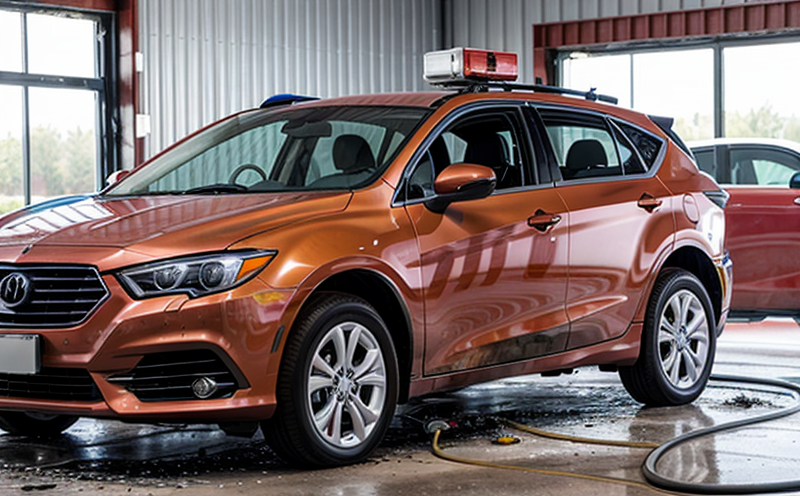ISO 11925-2 Ignitability Testing of Vehicle Interior Surfaces
The ISO 11925-2 standard is a critical component in ensuring that automotive components, especially those found within the vehicle interior, meet stringent fire safety requirements. This test evaluates the ignitability of materials used in vehicle interiors to prevent potential fire hazards. Compliance with this standard is essential for manufacturers aiming to protect passengers and adhere to international safety regulations.
The process involves exposing samples of the material under specified conditions to determine their resistance to ignition by an open flame. The testing simulates real-world scenarios where a component might come into contact with a source of ignition, such as a cigarette or a spark from a vehicle's electrical system. The results help manufacturers identify materials that are more resistant to igniting and thus enhance the overall safety of vehicles.
Our laboratory adheres strictly to the ISO 11925-2 standard, ensuring that every test is conducted with precision and accuracy. We use state-of-the-art equipment and follow rigorous procedures to provide reliable and reproducible results. Our team of experts has extensive experience in this field, ensuring that each test is conducted under controlled conditions that closely mimic real-world scenarios.
The testing process typically involves the following steps:
- Preparation of the specimen according to ISO 11925-2 specifications
- Exposure of the specimen to an open flame for a specified duration
- Observation and recording of any ignition or flaming behavior
- Analysis of test results to determine compliance with the standard
The acceptance criteria are based on whether the material ignites, burns, or continues burning beyond 10 seconds. Compliance ensures that materials used in vehicle interiors do not pose a significant fire risk. This is particularly important for components such as seat upholstery, door panels, and other interior trim materials.
Our laboratory has successfully conducted numerous ISO 11925-2 tests for various automotive manufacturers, providing them with critical data to enhance product safety. By leveraging our expertise and state-of-the-art facilities, we ensure that every test is conducted under the highest standards of accuracy and reliability.
Eurolab Advantages
At Eurolab, our commitment to excellence extends beyond mere compliance with international standards. We offer several advantages that set us apart from other laboratories in the field:
- Comprehensive Testing Capabilities: Our laboratory is equipped with advanced testing equipment and skilled personnel capable of handling a wide range of materials.
- Rigorous Quality Control: Every test undergoes multiple quality checks to ensure accuracy and reliability.
- Expertise in Automotive Safety: Our team has extensive experience in automotive fire safety, providing deep insights into material behavior under ignition conditions.
- Fast Turnaround Times: We understand the importance of timely results for product development cycles, ensuring that our clients receive their test reports quickly.
- Confidentiality and Security: Your data and samples are always handled with utmost confidentiality to protect your intellectual property.
- Custom Solutions: For unique testing requirements, we offer tailored solutions to meet specific needs.
These advantages make Eurolab the preferred choice for automotive manufacturers seeking reliable and accurate fire safety testing services.
Why Choose This Test
- Enhanced Safety: Ensures that materials used in vehicle interiors do not pose a significant fire risk, protecting passengers and reducing the likelihood of fires.
- Regulatory Compliance: Helps manufacturers meet international safety standards, ensuring compliance with ISO 11925-2 specifications.
- Data for Product Development: Provides critical data that can be used to improve product design and enhance overall vehicle safety.
- Cost Savings: Early detection of non-compliant materials helps avoid costly rework or recalls later in the development process.
- Reputation Enhancement: Demonstrates a commitment to quality and safety, enhancing your brand's reputation among consumers and regulatory bodies.
- Competitive Edge: By ensuring compliance with this standard, you can gain a competitive advantage by offering safer products in the market.
- Expertise and Experience: Our team has extensive experience in automotive fire safety testing, providing deep insights into material behavior under ignition conditions.
Selecting ISO 11925-2 ignitability testing for your product is a strategic decision that can significantly impact the safety and success of your vehicle interiors. This test not only ensures compliance with international standards but also provides valuable data to enhance product design and development.
Competitive Advantage and Market Impact
The ISO 11925-2 ignitability testing is crucial for automotive manufacturers as it directly impacts the safety and reputation of their products. By ensuring that materials used in vehicle interiors meet stringent fire safety standards, manufacturers can significantly reduce the risk of fires within vehicles. This not only protects passengers but also enhances the overall safety and reliability of the vehicle.
Compliance with this standard is a critical aspect of quality management and compliance programs. It demonstrates a commitment to product safety and regulatory compliance, which are essential for maintaining a positive brand image. In today's competitive market, where consumer trust plays a significant role in purchasing decisions, ensuring that your products meet the highest safety standards can be a key differentiator.
Moreover, ISO 11925-2 testing provides valuable data that can be used to enhance product design and development. This information is crucial for R&D engineers as it helps them identify materials that are more resistant to ignition and flaming behavior. By leveraging this data, manufacturers can improve the safety features of their products, leading to enhanced customer satisfaction and increased market share.
The test results also help in meeting regulatory requirements, which can be a significant advantage in terms of avoiding costly penalties and negative publicity. By ensuring compliance with international standards, manufacturers can demonstrate their commitment to quality and safety, thereby gaining the trust of consumers and regulatory bodies alike.
In conclusion, ISO 11925-2 ignitability testing is not just a mandatory requirement but also a strategic decision that can significantly impact the success and reputation of your automotive products. By ensuring compliance with this standard, you are taking a proactive step towards enhancing product safety, protecting passengers, and maintaining a positive brand image.





